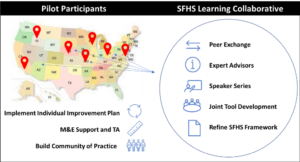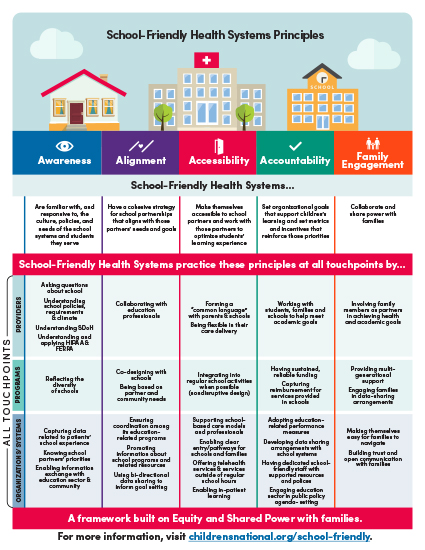A School-Friendly Health System is one actively working at the provider, program, and system level to ensure all children reach optimal health and achieve their full academic potential
In November 2022, Children’s National Hospital hosted a virtual Inaugural School-Friendly Health Systems (SFHS) Learning Collaborative meeting that brought together more than 30 attendees across eight health care organizations and national partners who have been leading and coordinating early childhood and K-12 school health initiatives across the nation. The goals of this meeting were to strengthen the familiarity, communications, and relationships among the inaugural SFHS cohort, develop a SFHS multi-year pilot logic model and prepare for the 2023 meetings and beyond. This effort was facilitated by RESOLVE (a Washington, D.C.,-based nonprofit based specializing in collaborative process design) with funding from Children’s National and the American Academy of Pediatrics through a grant from Kaiser Permanente Thriving Schools.
Health care organizations are transforming the way they approach medicine by focusing on non-clinical needs like housing, food and education. Education is a critical social determinant of health and has long-term effects on children’s health and economic outcomes. Missed educational instruction during the COVID-19 pandemic impacted families and was compounded by lack of access to critical services and supports in schools, such as meals and school-based health services. As students, educators, parents and pediatricians face the ongoing challenges of the COVID-19 pandemic, it is critical for the health and education sectors to align efforts and drive innovative programs and policy change efforts to address the needs of children. Partnering with schools in a health system’s local service area will not only improve service delivery to the students receiving care from the health system but will help strengthen health outcomes and overall student performance. Given the fundamental interrelation of health and education, hospitals and health care organizations need a holistic framework to guide their school partnerships and other efforts to make a positive impact on patient and family engagement, health care costs, health outcomes and, ideally, patients’ learning experience.
“SFHS is a needed framework to ensure we are maximizing our cross-sector partnerships to improve student health” – SFHS Pilot Site Participant
In 2019, Children’s National in Washington, D.C., launched an initiative to articulate principles of a SFHS, a school health partnerships framework, based on lessons learned from nationally recognized baby-friendly hospitals and age-friendly health systems initiatives. Becoming school-friendly means that hospitals and health systems have made a commitment to actively help children reach optimal health and achieve their full academic potential. With input from expert stakeholders, including pediatricians, educators, school administrators, school nurses, parents and community health experts, Children’s National released the five Core Principles of a SFHS in 2021 (updated in 2024).
In Fall 2022, Children’s National launched a pilot planning process to utilize the five SFHS principles with hospitals and primary care centers who have been leading and coordinating school health programs and initiatives. This initial planning has garnered the commitment of eight institutions who are now ready to pilot the SFHS framework with school districts in communities across the country. Children’s National (Washington, D.C.) serves as the program lead for the SFHS initiative in addition to being an active part of the learning collaborative cohort. Seven additional children’s hospitals and a community health clinic have expressed interest in participating as a potential site including, Children’s Health of Orange County (Orange, CA), Children’s Hospital & Medical Center (Omaha, NE), Children’s Mercy (Kansas City, MO), Children’s Wisconsin (Milwaukee, WI), Cincinnati Children’s Hospital Medical Center (Cincinnati, OH), Mary’s Center (Washington, D.C.) and St. Luke’s Children’s Hospital (Boise, ID). 
As currently conceptualized, this pilot program will support sites to increase competency and improve practices in alignment with at least one SFHS principle. The Learning Collaborative will leverage their implementation experience and input to produce a refined version of the SFHS framework and form a suite of tools that can be used by other hospitals and health systems and future learning cohorts across the nation.
Children’s National, RESOLVE and the SFHS Cohort will seek funding to sustain the SFHS Learning Collaborative and launch/measure the impact of a national SFHS Pilot. The Learning Collaborative will stay connected by convening again in March 2023. Individual SFHS cohort members will also identify what SFHS priorities and cross-cutting issues to work on as individual pilots or team up with other pilot sites.
For more information on the SFHS Learning Collaborative, contact School Partnerships@childrensnational.org.
Header image by Tim Mossholder on Unsplash
About the author

Julia DeAngelo, MPH
Program Manager for School Strategies within the Child Health Advocacy Institute at Children's National Hospital




